
Hoteliers have a reputation for being slow to incorporate new technology into their properties. Over the last 10 years, despite the astounding speed of technological progress, the industry didn’t necessarily see hotel owners and operators champing at the bit to add new capabilities to their existing infrastructure. After all, when times are good, why rush to change your approach? With year-after-year of record-high occupancies, there wasn’t much incentive to seek out the new.
The pandemic has changed that. Out of necessity, hoteliers are using technology to bridge the gaps created by COVID-19, implementing contactless solutions, installing antimicrobial surfaces, and using new sales and operational tools that they would not have considered in the “before times.”
The COVID Effect
For seven months now, COVID-19 has disrupted the hotel industry. According to CBRE, 2020’s overall occupancy is projected to be just 39.8 percent. The American Hotel & Lodging Association (AHLA) paints an even darker picture. A recent survey of 1,000 AHLA members showed that 74 percent of hotels will be forced to lay off more employees without governmental aid and that two-thirds of hotel owners will be forced to close within six months without assistance.
It’s clear that things aren’t going back to the way they were before. Hotel owners and operators are now in a position in which they not only have to drive revenue, but also keep employees and guests safe from a dangerous and highly contagious disease. To that end, vendors have stepped up to the plate and have been developing solutions to some of the most pressing issues facing hoteliers during the pandemic.
Leveling Up
Kristi White is vice president of product management at Knowland, a company that provides solutions for the group sales process. She says that after lockdown started, she and her colleagues pretty quickly concluded that they needed to start working on something to help hoteliers survive in a pandemic environment. “Initially, I think we all thought that we were going to go home for a couple of weeks and then the world would return to normal. That didn’t last long,” she describes. “Once we realized that this would be an ongoing issue, we quickly tried to figure out what we as a hospitality vendor could do for our hotels. We knew they would need new tools because the existing systems were not built to help an industry battling a recession or coming back from some type of black swan event.” In May, Knowland released a free, interactive Hotel Recovery Dashboard to provide actionable insights on COVID-19 recovery. In August, the company also announced Prospector, a solution meant to help select-service and boutique hotels source group business.
White adds that hoteliers need to be looking for a way to make a connection during “this darkest of times.” “Those are the hotels that are going to succeed and those are the hotels that are going to recover first and fastest,” she says.
Another technology company that pivoted during the pandemic is Fetch, which was created to deliver one-touch, mid-stay surveys for guests. Fetch founder and CEO Russell Silver says that when COVID started impacting the industry in March, he knew the company had to respond. “We’re a company that supports the hotel industry. If the hotel industry doesn’t exist, there’s nothing for us to support.”
So, he and his team got to work, adapting their solution to facilitate an entirely contactless experience for guests and staff. “Contactless features that were nice before are now absolutely mandatory,” he asserts. “We launched an entire case management system, built-in alerts and marketing, and doubled down on all of our analytics. Now, guests can feel safe communicating with the hotel from their own devices, and the hotel has the same capabilities.”
Silver adds that grim times often lead to leaps forward in technology. “It’s usually war that prompts a ton of innovation,” he says. “This obviously isn’t a war, but the world really hasn’t seen anything like this in a really, really long time.”
“You will always need people who know how to build things, fix things, and create things.”
— Vanessa Ogle, CEO and Founder, Enseo
Vanessa Ogle, CEO and founder of Enseo, a technology services provider, has similarly embraced her company’s contactless solutions in light of the pandemic, and has been working since March to expand their capabilities. The company has earned more than 10 new patents in 2020 and earlier this year, Enseo launched VERA (Video Enabled Remote Agent), a live, full-service front desk agent who interacts with guests through a Webex portal, and MadeSafe Checkpoint, a thermal scanner that verifies associate temperatures at the start of every shift. VERA in particular has been very well-received by Enseo’s hospitality clients. “It’s amazing watching how many guests are now comfortable with being greeted by someone on a screen. VERA lets a hotel provide warm human interactions in a way that is safe, which is critical at a time like this,” Ogle notes. She adds, “We are working so hard to bring new products to market so that they can be a part of the solution to the issues affecting the hotel industry.”
New Additions
COVID has also opened hospitality’s doors to vendors who had not traditionally been a part of the industry.
One such vendor is Amy Yu, co-founder and owner of Antlia Systems, a security and detection systems company that recently started offering thermal detection solutions for public spaces such as schools and hotels. Antlia Systems’ thermal technology scans a person’s temperatures as they enter a space and is able to alert the hotel if a guest or associate has a fever instantaneously. “We’re a security company,” Yu describes. “Even before COVID, we were looking around for opportunities to improve our technology and meet people’s needs globally. We’re always adding more technology, improving technology, and creating products and solutions that help people.”
When COVID-19 hit, Yu and her team looked for ways to upgrade their current offerings to meet new needs presented by the pandemic. They decided to add thermal scanning to their existing metal detecting technology. “We focused on scanning for fevers because it is one of the foremost symptoms of a COVID infection,” she notes.
Once Yu decided to pursue this type of technology, the development process took off and moved at a breakneck pace. “We developed the product in about two months,” Yu says. “I was sleeping three to four hours a night to figure it out. It was a lot of pressure, and we invested a lot of time and energy into the final product. We didn’t just want something that just worked; we wanted something that worked the best. Even now that the product is to market, we’re still working to improve it.”
Grim times often lead to leaps forward in technology.
Another entrepreneur who recently entered the hotel space is Zeynep “Z” Ekemen, the founder of Silver Defender. Silver Defender offers stretchable films with patent-pending, built-in antimicrobial properties that protect high-touch surfaces like handrails and door handles for up to 90 days at a time. Though this seems to be a product specifically of the COVID-19 era, Ekemen says the idea for the Silver Defender came to her in 2018 when a friend mentioned she didn’t want to touch a door handle after using a public restroom. “No one wants to touch that door handle,” she remembers thinking to herself, and the idea for Silver Defender was born. The company officially launched in January of this year. As one can imagine, it took off immediately. “It literally went from 0 to 100 overnight,” Ekemen describes. “I still haven’t been able to take a moment to take in what has happened over the last six months.”
Silver Defender’s film uses silver ions to kill viruses and bacteria that may otherwise linger on a surface. “Embedding silver ions into the plastic took a few tries and a lot of scientific research, but it was doable,” Ekemen describes.
Ekemen says that hoteliers have been extremely interested in the product since its launch. “It helps guests feel safe, no matter what they touch,” she says. “We have customers using it on their luggage carts, housekeeping carts, and more. Whatever they think needs extra protection.”
Long-term Changes
HOTELIERS WANT MORE
As mentioned at the beginning of this story, hoteliers have been slow to adapt when new technology comes to market. That is no longer the case.
“These days, instead of hoteliers looking at me and saying, ‘Oh Vanessa, another gadget? Really?’ they’re coming to me and asking if I have a solution to their problem. They’re asking, ‘Can you make this work for me?’” Vanessa Ogle, CEO and founder of Enseo, describes. “It’s very different from what I was used to.”
Zeynep “Z” Ekemen, founder of Silver Defender, is having a similar experience. “Hoteliers are reaching out to us. It’s something that every startup wishes would happen. We have customers calling us constantly and we can’t keep up with demand.”
Russell Silver, CEO and founder of Fetch, says the pandemic has helped his company close deals with hoteliers who had been waffling about Fetch for weeks, months, and in some cases, even years. “COVID-19 has turned the hospitality industry upside down,” he says. “The world is a very, very different place and hotels need a new playbook. We’re just trying to be a source of strength for those hoteliers at this time.”
While this pandemic won’t last forever, its effects will likely be felt in the hotel industry for years to come. For starters, people may be reluctant to let go of social distancing for some time. Ekemen says, “I think a lot of things will return to normal. People will start to feel comfortable being in close proximity again and won’t be so scared. I hope that happens as soon as it’s safe. But, there will be a heightened awareness, and people will still be using products that they feel will keep them safer.”
Ogle believes that hotel companies will be more open to sourcing outside solutions for technology issues in the near future. “When times are good, these big brands invest in their technology department. Now, though their focus is on other things. They are going to be looking for assistance from vendors to keep their solutions current.”
White predicts that the way hotels operate, particularly when it comes to sales, will be impacted by the pandemic for a very long time. She notes that over the last few years, hotel sales were more of a “farming” operation—salespeople had to cultivate contacts, but those contacts were readily available. Now, it’s more of a “hunting” scenario, where they have to look harder and further to find opportunities. “Owners are going to step back and realize that their salespeople who became ‘hunters’ are going to be the most successful. Those are going to be the next leaders in our industry, and that mindset will proliferate for at least the next five to seven years,” she describes.
While COVID has changed—and will continue to change—the industry, it won’t change the mindset of these vendors. Ogle says, “You will always need people who know how to build things, fix things, and create things. And when there’s a problem, innovators will always want to be a part of the solution.”











